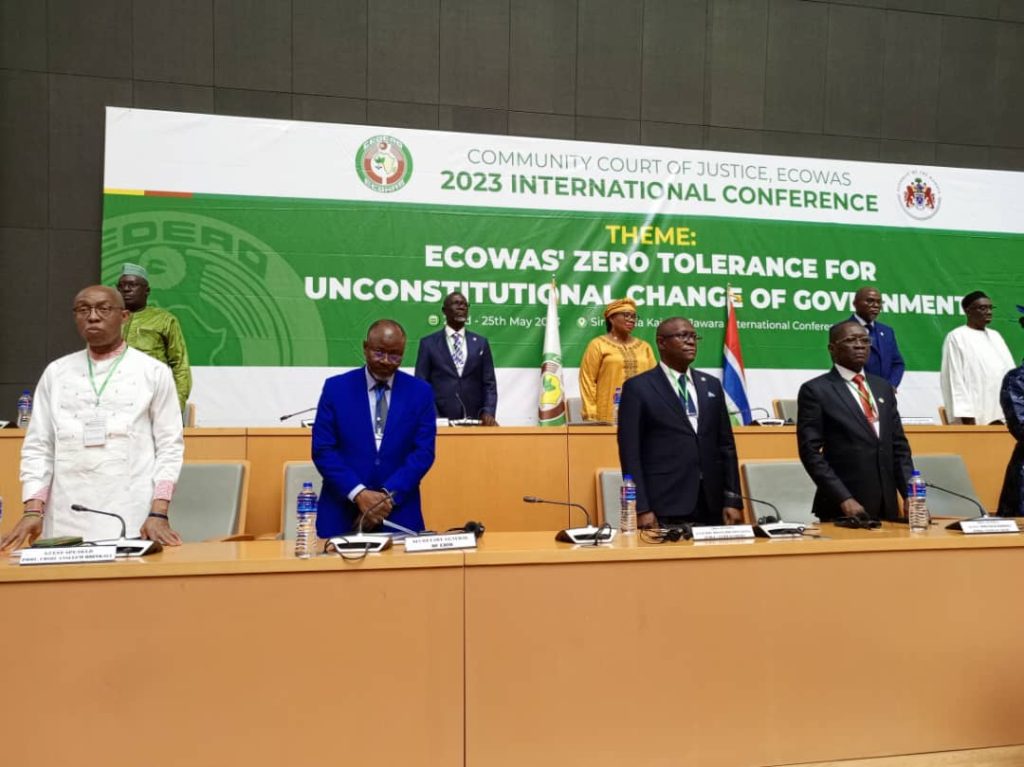Accra, May 23, GNA – Deputy Attorney-General and Minister of Justice, Diana Asonaba Dapaah, has urged ECOWAS to take proactive measures to prevent coups by promoting democratic consolidation in member states and strictly enforcing its norms against coup makers and pseudo-democratic civilian leaders to achieve its full potential for sustainable development.
She said while condemning coup makers and imposing sanctions were good; they were often a belated response to the real problem that could be prevented by strictly enforcing relevant ECOWAS and AU norms to forestall election rigging schemes, elimination of term limits, and other undemocratic practices by incumbents, which often precipitate military interventions.
Mrs Dapaah was speaking at the ongoing ECOWAS Court International conference in the Gambia on the theme: “ECOWAS Zero Tolerance for Unconstitutional Change of Government.”
The conference, which would explore the rule of law and the underlying factors of political stability is on the back of military interventions in governance through military coups in the past two years in three ECOWAS Member States- Republics of Mali, Guinea and Burkina Faso.
Presenters will also discuss the various dimensions of the ECOWAS security architecture as well as human rights as a factor for democracy, peace and security including the role of Member States to respect, protect and fulfil their human rights obligations as well as the role of elections as a trigger for conflicts.

The other presentations will examine the role of the national and the ECOWAS Courts in upholding human rights, rule of law and constitutional democracy; the enabling legal environment for ECOWAS integration with community law in perspective and undertake an appraisal of the judgment enforcement mechanism of the ECOWAS Court.
Mrs Dapaah said to reverse the spate of military interventions in West Africa, ECOWAS needed to promote democratic consolidation in member states through technical assistance and support for electoral processes, promoting the participation of civil society in governance, and strengthening the capacity of national human rights institutions.
“By promoting democracy and good governance, ECOWAS can create a conducive environment for the peaceful transfer of power through elections,” Mrs Dapaah said.
Besides, there must be the enforcement of the existing ECOWAS and AU instruments on democracy and governance by imposing sanctions not only on coup makers, but also on autocratic civilian incumbents who manipulate constitutional and electoral rules to win elections or extend their mandates.
She said the lack of sanctions for those leaders complicit in the constitutional and legal manipulation aspect of the prohibition of unconstitutional changes of government certainly had a contamination effect by encouraging leaders in other countries to try similar tactics.
ECOWAS and the AU may also need to plug a loophole in their Democracy and Governance instruments which some leaders are exploiting.
For instance, the ECOWAS Protocol requires ‘strict adherence to democratic principles’ and under the AU Charter on Democracy,
Elections and Governance, unconstitutional change of government is defined to include ‘any amendment or revision of the constitution or legal instruments, which is an infringement on the principles of democratic change of government.’
However, neither instrument defines what is meant by ‘democratic principles’ or ‘principles of democratic change of government’.
“Thus, for instance, it is debatable whether a constitutional amendment by an incumbent to abolish presidential term limits violates democratic principles or principles of democratic change of government. Similar doubts exist about the exclusion of electable opposition candidates from an election through various machinations, including politically motivated prosecution.”
To prevent the exploitation of the vagueness of these principles, ECOWAS and the AU must flesh out their content by spelling out bright-line rules or standards on matters like presidential term limits and other legal or constitutional changes that violate democratic principles.
Such standards will provide clear benchmarks of democratic behaviour for states and their leaders and better assist ECOWAS and/or the AU in detecting or determining non-compliance for the purpose of sanctions.
In addition, ECOWAS must increase the cost of unconstitutional changes of government by imposing economic sanctions on coup leaders and their supporters, while targeting the sanctions to minimize the impact on ordinary citizens.
“One way to minimize the impact of sanctions on coup leaders and the state is to require that the state and its military leaders continue to comply with human rights obligations despite suspension from subregional or regional bodies.”
Professor Chidi Anselm Odinkalu, the Guest Speaker at the opening session of the conference, said when regional institutions consistently certified crooked elections or ballots that were manifestly lacking in credibility, they lost standing as credible arbiters on questions of unconstitutional governments.
This calls for greater clarity concerning the applicable standards to govern the credibility of elections.
“It is clear that the UCG undoubtedly causes a setback to the pursuit of development in the region. The UCG could also be a consequence or evidence of the failure of regional compliance with standards of good governance,” he said.
He said that an effective approach to addressing the problem of unconstitutional governments required a credible regional supervision of elections, which is not the case presently.
Professor Odinkalu said a credible elections would make it possible to assert and implement the sanctions against unconstitutional governments much more firmly.
“Absent a credible prophylactic programme, it will be difficult for the region to fully preclude the opportunism or the desperation of popular uprisings.”
GNA